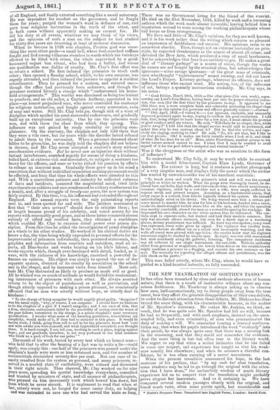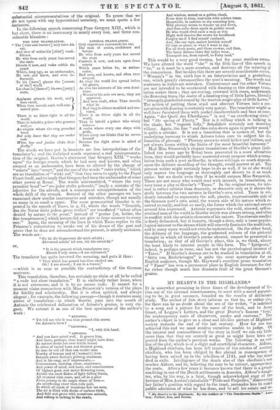THE NEW TRANSLATION OF GOETHE'S TASS0. 0 IT has often been
remarked by close and sardonic observers of human nature, that there is a touch of instinctive wiliness about any con- scious feebleness. Mr. Thackeray is always asking us to observe how men, half-unconsciously, try to decoy people away from the true scent, how they affect the greatest disapprobation of their own defects, in order to distract attention from those defects. Mr. Dickens has illus- trated the same thing, with his characteristic humour, in the matter of Mr. Spenlow's intestacy. He makes Mr. Jorkins, we think, re- mark, that he was quite sure Mr. Spenlow had left no will, because he had so frequently, and with such emphasis, insisted on the unex- ampled folly, and even criminality, of men who procrastinated the duty of making a will. We remember hearing a learned mathema- tician say, that when his pupils introduced the word "evidently" into their proofs, he was always quite sure that there was a missing link in the reasoning, and that they could not remember the evidence. And the same thing is but too often true in the literary world. We regret to say that when a writer intimates that he has failed in some one respect, sad experience has taught us that his weak- ness usually lies elsewhere; and when he assumes a cheerful con- fidence, be is too often carrying off a secret uneasiness. When the present translator announced his hope, in the last sentence of his preface, that " by my rude but close translation, some students may be led to go through the original with the atten- tion that I have done," the melancholy wisdom of much literar experience led us to suspect that the translation might probab y prove elegant but inaccurate. And so it certainly is. We have compared several random passages closely with the original, and found much taste, often some poetic spirit, but considerable and • Godlies Torquato Tease. Translated into English Verse. London: David Nutt.
substantial misrepresentations of the original. To prove that we do not speak with any hypercritical accuracy, we must quote a few instances.
In the following speech concerning Pope Gregory XIII., which is but short, there is an inaccuracy in nearly every line, and three con- siderable blunders :
THE NEW TRANSLATION.
"The [wise and learned] only have his ear, And men of action his [chief] confi- fidence He who from early years has served the state Directs it now, and rules within the court Which, long ago, as an ambassador, He saw, and kuew, and even in- fluenced.
To his [keen] glance the [secrets of the] world Lie clear as [those of] his own [petty] state.
Applause attends his work, and men exult, When time unveils each well-con- ceived plan.
There is no fairer sight in all the world
Than to behold a prince who governs well,—
An empire where the very proudest bend But only know that they are under rule When law and justice claim their fealty."
The words we have put in brackets are free interpolations of the translator's; and the italicized words represent a real misrepresenta- tion of the original. Goethe's statement that Gregory XIII. "works upon" the foreign courts which he had seen and known, and often swayed as an ambassador, have been so altered by the change of " courts" into "court," and the use of the words "rules within," which are no translation of " wirkt auf," that they seem to apply to the Papal Court itself, and to imply that Gregory had been the ambassador of some other power at Rome. The words mistranslated, "where the very proudest bend"—" wo jeder stoltz gehorcht," imply a mistake of the adjective for the adverb, and a consequent misapprehension of the whole drift of the remark. Several of the other passages we have examined show similar inaccuracies and mistakes, though not usually so many in so small a space. The same grammatical blunder is re- peated in the speech of Tasso, in p. 61, where the words " Gemiith, das die Natur nicht jedem gross verlieh" are translated "talent often denied by nature. to the great," instead of "genius [or, better, the fine temperament] which nature did not give in large measure to every one." Again, the meaning of the lines in which Tasso replies to the Princess's exhortation to awake out of his dream of the past and prove that he does not misunderstand the present, is utterly mistaken. The words are :
"Es ist die Gegenwart die midi erhuht ; Abwesend schein' ich nor, ich bin entziickt."
"It is the present which transfigures me; Absent I only seem,—I am entranced."
The translator has quite inverted the meaning, and puts it thus : "That which has passed has thus excited me. Oh! I am absent ; I am in a trance."
—which is as near as possible the contradictory of the German sentence.
This translation, therefore, has certainly no claim at all to be called "a rude but close translation." It is uniformly rather loose, when it is not erroneous, and it is by no means rude. It cannot for a moment claim comparison with Miss Swanwick's version of the plays for fidelity and scholarship. But it is often spirited, and always elegant ; for example, the following passage—though it contains many errors of translation—in which Goethe puts into the mouth of Antonio the celebrated delineation of Ariosto's genius, is very de- sant. We extract it as one of the best specimens of the author's work :
"ANTONIO.
"Yet tell me who it was that pressed this crown On Ariosto's brow ? "LsoNon.A. "I, with this hand.
"ANTONIO.
"And you have acted well. It graces him, And more, perhaps, than laurel might have done.
As nature decks her ever fertile breast In robes of varied hues and freshest green, So does he veil all that can render man Worthy of honour and of [woman's] love Beneath sweet fiction's glowing ornament.
And in his song, as if impersonate,—
Contentment, learning, sense, experience, And power of mind, and taste, and consciousness Of highest good, rest under flowering trees, Amidst the snow-flakes of light falling bloom,
All crowned with roses, and all in a glow From joining in the magic dance of love.—
An overflowing river then rolls past, In which all kinds of wondrous fish are seen, The air is filled with flocks of curious birds, And field and grove with monstrous animals, And villany is larking in the shade,
LITERAL TRANSLATION.
Only experience commands his ear, The man of action, confidence and favour.
He who from early years has served the state Controls it now, and acts upon those courts
Which years before he, as ambas- sador,
Had seen, and known, and often even swayed. As clear the world lies spread before his glance, As e'en the interests of his own domi- nions.
Whene'er his acts are seen, they are I approved, 'And men exult, when Time unveils what be
Had long in silence moulded and ins- .
There is no fairer sight in all the world, Than to behold a prince who wisely rules,— A realm where every one obeys with pride, Where every one thinks that he serves himself Because the right alone is asked of him.
or,
And wisdom, seated on a golden cloud, From time to time, instructs with solemn tones. Meanwhile, in cadence to the sounding lyre, Wild phrenzy seems to wander up and down, And then calm down again in gender mood. He who would rival such a man as this Might well deserve the crown for hardihood. Forgive me if I find myself confused, And, like one rapt, cannot bethink myself Of time or place, or what I want to say. For all these poets, and these crowns, and then, The fancy dresses these fair ladies wear, Transport me, from myself, to Fairy land."
This would be a very good version, but for some careless errors We have altered the word " she " in the fifth line•of this speech to "he," as it must be a mere erratum, and destroys all the meaning of the comparison. But besides this there are several considerable errors. " Woman's " in the sixth line is an interpolation and a gratuitous one, which greatly circumscribes the poet's meaning. The words and sentences in italics are mistaken. Contentment and the other Virtues are not intended to be overheated with dancing as this strange trans. lation makes them ; they are resting, crowned with roses, underneath the flowering trees,the centre of a dancing ring of little Loves, literally " stran,,oelygambolled-round by the wanton magic-play of little Loves.' The notion of i putting these staid and abstract Virtues into a per- spiration with dancing s certainly very 'quaint. The translator might as well have furnished them with pocket-handkerchiefs and fans at once. Again, "der Quell des ITherflusses " is not "an overflowing river," but "the spring of Plenty." Nor is it villany which is lurking in the shade, but "roguish folly," Schalkheit certainly not denoting villany. Again, the line "and then calm down again in gentler mood," is quite a mistake. It is not a transition that is spoken of, but the underlying harmony to which Ariosto takes care to subject his de- lineation of phrenzy. " Plirenzy seems to whirl hither and thither, and yet always keeps within the limits of the most beautiful harmony." Had Miss Swanwick's elegant translations of Goethe's plays (pub- lished ten years ago by Bohn) been presented in a more attractive form, they would probably have answered every purpose which a trans- lation from such a poet as Goethe, in whose writings so much depends upon the delicate moulding of the thought, could answer at all. The present writer might certainly hope to do as well, if he or she would only master the language as thoroughly and devote to it as much pains: but we doubt even then if he would surpass Miss Swanwick. There are not many who would read with interest, in translation, so very tame a play as Goethe's "Tasso." In the original even, its inte- rest is rather artistic than dramatic, or dramatic only as it shows the strife between the two natures in Goethe's own mind. Tasso is evi- dently intended to represents the soft, plastic, impressionable side of the German poet's own mind, the waxen side of his nature which re- ceived so easily, and lost so easily, the forms which the external events around him impressed. Antonio represents the cold, shrewd, self-re- strained man of the world in Goethe which was always strong, and often in conflict with the artistic elements of his nature. The chsonio conflict is finely delineated, but it imparts, though a deep, only a tame psycho- logical interest to the drama which will scarcely fascinate the multitude, and in many cases would not even be understood. On the other hand, the delicacy of the language, the graduated colours of the pictorial thought in which all Goethe's poems abound, cannot be preserved in translation; so that of all Goethe's plays' this is, we think, almost the least likely to interest people in this form. The " Iphigenia," indeed, is perhaps as tame, and has not the psychological interest of "Tasso." If Goethe's dramas are to be studied in translation at all, " Gotz von Berlichringen" is quite the most appropriate for an English audience, though Mr. Hayward's excellent prose translation of "Faust" has won a permanent place in English literature for that far richer though much less dramatic fruit of the great German's genius.































 Previous page
Previous page